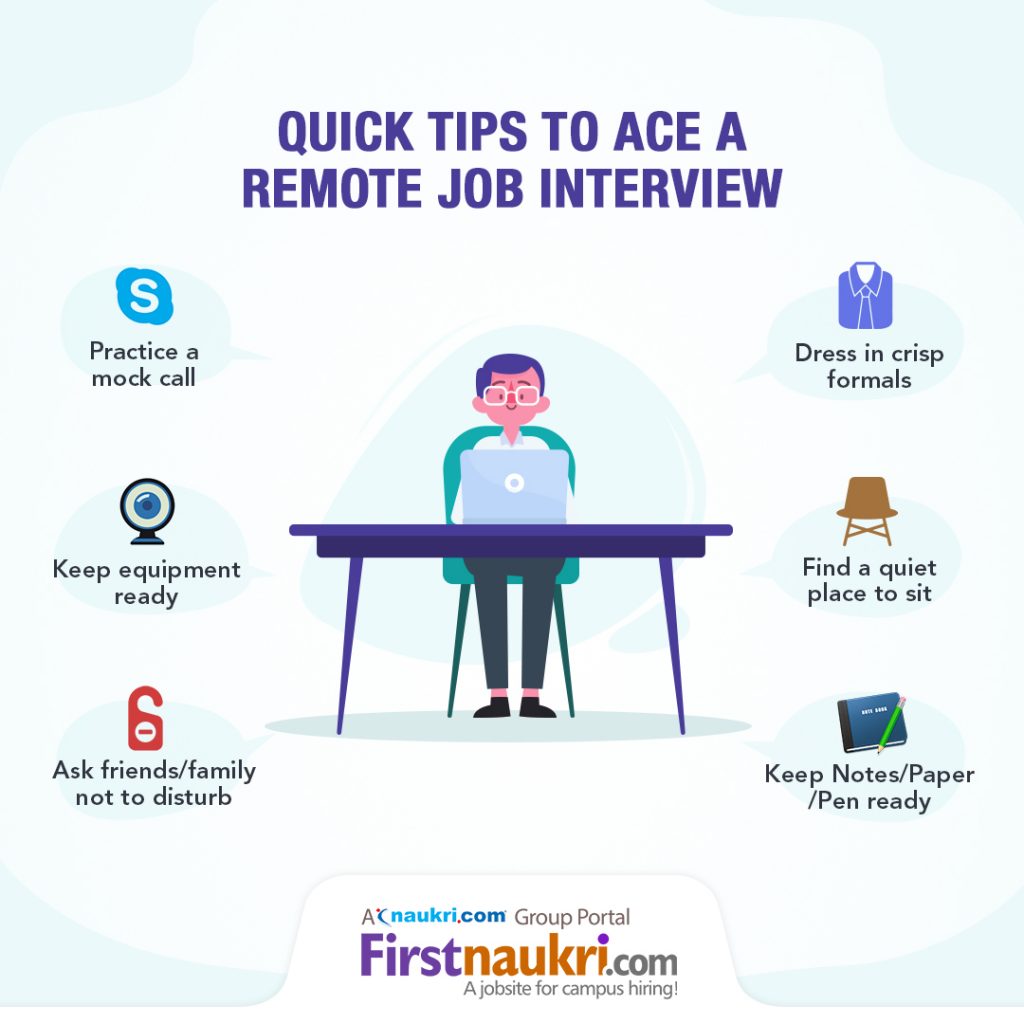The aviation industry in India has witnessed remarkable growth, with domestic air traffic increasing by over 300% in the past decade. This expansion has created numerous opportunities for aspiring cabin…

10 Tips for a Successful Remote Job Interview
The coronavirus pandemic is gripping countries across the globe, and only some industries are somewhat unscathed by the COVID-19 pandemic’s consequences. This is currently having visible implications on the workforce and also on the recruitment processes, especially those concerning freshers. In this regard, a few companies have frozen their hiring cycle till the time economic impact of coronavirus is minimal, while some other organizations are still recruiting freshers to fill open roles and also to avoid business slowdown.
Funnily, the global pandemic due to COVID-19 has also increased hiring across professions related to infectious diseases. Also, there has been a surge in demand for jobs in sectors like healthcare, biotech and pharmaceuticals. On the other hand, companies are now coming up with innovative recruitment process like e-joining, e-relieving etc. amid social distancing protocols and work from home policies. Some companies have made a 100% adoption of novel interviewing and meeting methods through skype, telephonic and video conference calls. This is an attempt to ensure business continuity during such uncertain times as well as to avoid the impact of COVID-19 pandemic on business.
Some tech giants across the globe have formally announced in the media that online job interviews are the future, until the corona outbreak gets curbed. On the other hand, download numbers of video conferencing apps like Zoom, Skype, Slack, MS Teams have shot up considerably since January.
10 advices for fresher candidates for a remote job interview

Remote job interview tips
1 Test your tech equipment
Now that you are done creating a fresher resume and writing a cover letter, its time to prep for the next step. (Have you tried the Firstnaukri resume maker yet? It is a free and reliable way to create a perfect resume.) You have received an interview call for a remote position. Remote job interviews are not different from in-person interviews. The company simply wants to figure out if you are the best fit as a candidate for the job opening. And, of course, you want to know if this company is best for you. To start, ensure your internet connection and video conferencing program/app are working fine prior to your interview.
2 Use a high-quality webcam and microphone.
This is not as important as your qualification, but a low-quality microphone or webcam during a remote job interview might hurt your chances for the job. Just imagine how it would feel if you were not audible for the entire duration of the interview! That would be a disaster!
Similarly, a lousy webcam might show that you are not interested to get hired! Interviewers want to see and hear you clearly and easily.
3 Look at the right place.
Once you are done with testing your equipment, test yourself. Experiment with placement of laptop or webcam to get the best angle. If it is a cam it should be at the top center of your screen. If it is a laptop with a built-in webcam, keep your laptop on your desk. Place a few books underneath the laptop to elevate the webcam at your eye level or higher.
4 Dress appropriately
Dress for success. It is no less important on a remote or online interview. Dress smartly, like you would for an in-person interview, and ensure your surroundings are tidy.
5 Take care of the little things.
Anticipate problems and try to eliminate them before they occur. For a remote interview, close unnecessary software on the computer. Turn off notifications. Keep the laptop or machine or device fully charged. Or, conduct the interview while it’s plugged into a power source. If that’s not an option, make sure you have backup batteries on hand in case the interview goes long. Ensure no pets or children can interrupt your conversation.
6 Be prepared
Do your homework just as you would for any other face-to-face interview. Rehearse your responses to key interview questions. Also, prepare your own questions for the interviewer.
7 Be personable
Make eye-contact. Smile as often as possible. Engage with your interviewer cordially to demonstrate your enthusiasm for the role.
8 Remove distractions
Ensure you’re fully engaged with the interviewer. Get rid of all distractions like your smartphone, TV, radio etc. Close the door to the room you are sitting in and lock it from inside. Notify friends and family in advance about the interview.
9 Have your resume handy.
Keep a hard copy of your resume handy. It would not be advisable to have your eyes dart back and forth between multiple screens. Your attention should be totally on the interviewer. Else you would keep clicking back and forth between tabs. This will pave way for more technical difficulties. A paper backup will come in very handy. The same thing goes for old fashioned paper and pens for note-taking. There will be no clicking sounds or technical issues as you write.
10 Follow-up with your interviewer
Once the interview is done, send a follow-up mail to your HR contact or hiring manager. Also, thank them for their time on the mail, while you ask for a feedback.
As we can see already, migration into video conferencing is not unprecedented. There has anyway been a general upsurge in video interviews over the past few years, given the technological advancement and geographically distributed office locations. Remote hiring was already on the rise and the coronavirus pandemic has only accelerated it’s adoption.
This is not a new era of hiring managers or interview candidates. The processes remain the same, for example, an in person interview will still happen one-on-one, only that it will take place over a virtual screening process. Its upto fresher jobseekers to convey themselves the best while companies screen them online.
Posts Your Would Like To Read
- How to face telephonic interviews
- How to face a Skype interview
- Real telephone interview experience of a fresher
Latest Posts
How to Become a Psychologist: Complete Roadmap for Students
Psychology has gained immense importance over the past decade, especially in India, where awareness of mental health is growing rapidly. With more people seeking emotional, behavioral, and psychological support, the…
How to Write a Job Application Letter – Tips, Format, and Examples
When it comes to applying for your first job, making a great first impression is crucial. As a recent graduate, you might feel a little intimidated by the idea of…
Latest Banking Interview Questions and Answers for 2025
The banking sector offers a dynamic and stable career path, attracting ambitious graduates like yourself. As a fresher, preparing for your interview is crucial to showcase your potential and stand…
How To Become A Software Engineer in 2025 – Complete Guide
In today’s rapidly evolving digital landscape, the role of a software engineer has become increasingly crucial. As technology continues to shape our world, the demand for skilled professionals who can…
Popular Posts
65 Important Logical Reasoning Questions & Answers – For Freshers
Are you looking out for some quick help for your placement interviews preparation? We got your back! This article is a complete guide for you with some of the latest…
Best CV Formats for Freshers: Simple, Professional & Job-Winning Templates
Creating an effective CV (Curriculum Vitae) is the first step towards landing your dream job or internship as a fresh graduate. Your CV is your initial introduction to potential employers…
Top 21 Highest Paying Jobs in India For Freshers
The Indian job market is evolving rapidly, with new opportunities emerging across various sectors. As a student or fresher, identifying the best career in India that aligns with your interests…
25+ Best Online Courses for Graduates in 2025 [Free & Certified]
In today’s competitive job market, earning a degree is just the beginning. To truly stand out, college students and freshers must constantly upskill, stay updated with industry trends, and gain…
Top Computer Science Jobs for Freshers in India
The rapid evolution of technology has created immense opportunities for fresh computer science graduates. With the IT sector expanding globally, India is one of the top countries offering lucrative and…
